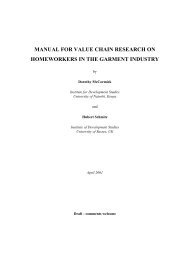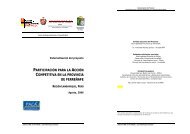OECD Culture and Local Development.pdf - PACA
OECD Culture and Local Development.pdf - PACA
OECD Culture and Local Development.pdf - PACA
You also want an ePaper? Increase the reach of your titles
YUMPU automatically turns print PDFs into web optimized ePapers that Google loves.
1. USING A TERRITORY’S CULTURE TO PROMOTE LOCAL DEVELOPMENT<br />
isl<strong>and</strong>s, overcoming the stereotypes attached to old buildings, linking environment<br />
<strong>and</strong> health dimensions, making vision <strong>and</strong> strategy determine rules <strong>and</strong> not the other<br />
way around, mobilising hidden assets starting with the energy of groups <strong>and</strong><br />
communities.<br />
The idea of associating artists <strong>and</strong> scientists (Sci Art Lab) took root, following the<br />
example of Glaxo Wellcome 22 , <strong>and</strong> creativity audits were undertaken, indicators were<br />
developed for measuring success against these new visions, <strong>and</strong>, more important than<br />
anything else, ways were sought to popularise a passion for learning, to make Adelaide<br />
a Learning City.<br />
<strong>Culture</strong> as a factor for business development<br />
The business culture is often defined as the set of values <strong>and</strong> norms that inspire<br />
or govern the behaviour of members of a business. In a similar way, we may speak of<br />
a territory’s entrepreneurial culture by looking at all the values <strong>and</strong> norms that bring<br />
players within a territory to put forward activity plans, <strong>and</strong> to implement them or not.<br />
We may conclude from this that a territory’s capacity to create business <strong>and</strong> jobs is<br />
linked to its entrepreneurial culture.<br />
For some observers, this question makes little sense. They will point out that creating<br />
a business means following certain rules <strong>and</strong> evoking certain behaviour, wherever that<br />
business may be located. From one territory to the next, businesses may not be<br />
organised in the same way or involve the same kind of cooperation, but they must<br />
always draw upon the same principles <strong>and</strong> a single entrepreneurial culture should<br />
be possible, regardless of the territory. Proceeding in this way, they tend to confuse<br />
two cultures that in fact need to be distinguished: the entrepreneurial culture <strong>and</strong><br />
the business culture.<br />
- The entrepreneurial culture involves all those qualities <strong>and</strong> skills that make<br />
individuals, organisations, communities <strong>and</strong> societies creative, flexible <strong>and</strong><br />
able to adapt to economic <strong>and</strong> social changes.<br />
- The business culture has to do with all the rules that lead members of the<br />
business to produce good results.<br />
There is, then, a difference between the entrepreneurial culture or the capacity<br />
to conceive <strong>and</strong> nourish projects, <strong>and</strong> a business culture that consists of carrying out<br />
those projects (Katz, 1999) 23 .<br />
Whether a territory has a productive fabric does not depend only on the vagaries<br />
of investment, industrial relocation, or the availability of management capacities. It<br />
32 CULTURE AND LOCAL DEVELOPMENT - ISBN 92-64-00990-6 - © <strong>OECD</strong> 2005














